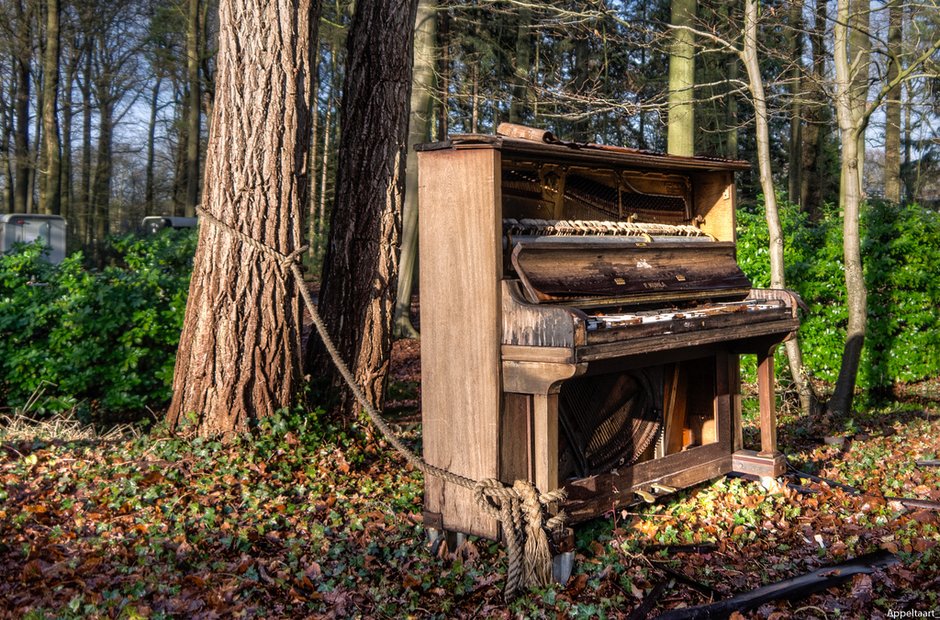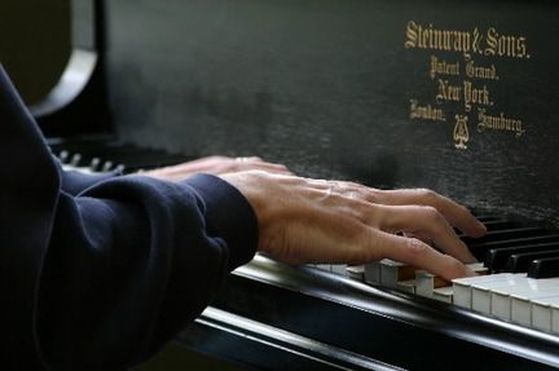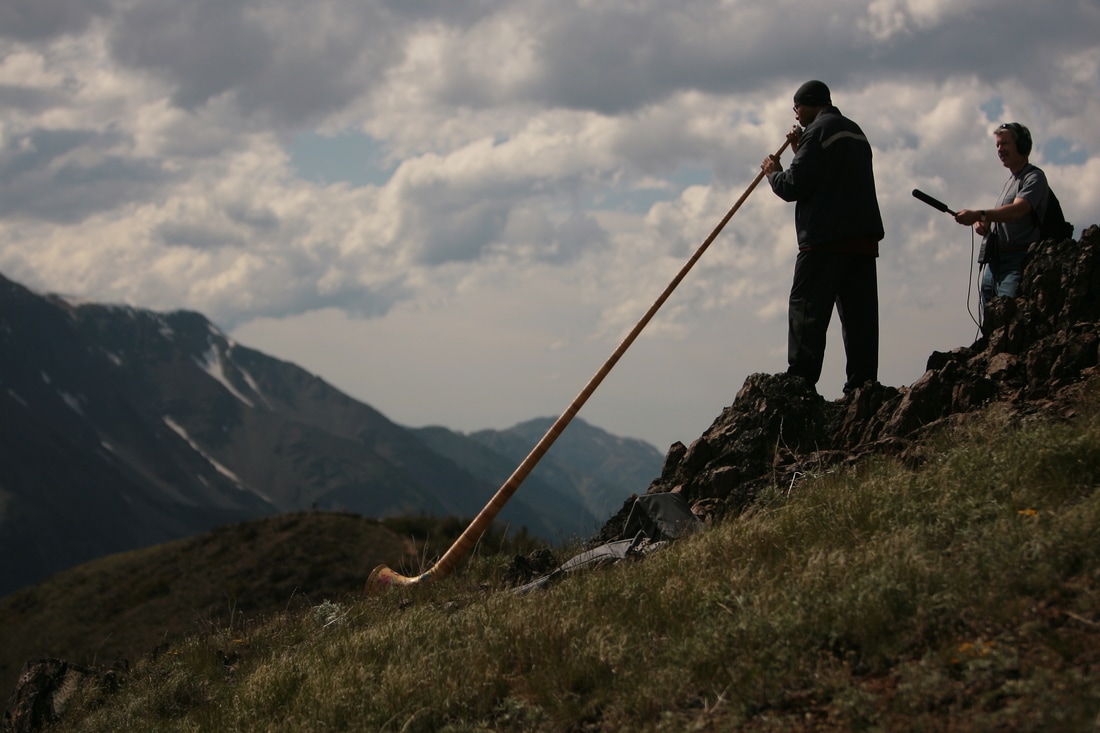 What's the story behind this piano, tied to a tree? Classicfm.com What's the story behind this piano, tied to a tree? Classicfm.com I love pianos for what they offer: an enormous range of sound, the physicality of playing the keys, contact with some of the great works of music. Pianos also provide stories of their own. Because they last a long time, pianos go through a lot. Several years ago, I wrote a story about this for The Oregonian called "The Secret Lives of Pianos." Photographer Torsten Kjellstrand and I found a bunch of pianos that had great stories to tell. We found a piano allegedly owned by Hitler's piano tuner. The piano Elliott Smith used to record several songs. A piano in the state penitentiary. A grand old Steinway presiding over Pioneer Courthouse in downtown Portland. I thought of that story as I was preparing my next class on The Piano, scheduled for April 30. Here's how the story started: They sit in courthouses and prisons. In Dumpsters and concert halls. In barns and family rooms. Some pianos are sleek and supple, purebreds born for power and speed. Others squat in corners, shoved aside like old couches, their voices dull and out of tune. Where have they been? In how many living rooms, bars or church basements? What have they seen? How many births, deaths, divorces, anniversaries? How many times have they played "Freres Jacques" or "Amazing Grace"? Mystery -- along with 7,500 moving parts -- lies at the heart of a piano. Each one has a tale to tell, and we're going to share some of them with you. But owners don't usually keep track of where their pianos came from, so yarns take hold. Some are doozies: A note on a piano's flank that sits in a barn in Hillsboro: This piano belonged to Adolf Hitler's piano tuner. Here's the link to the full story.
3 Comments
 Here's a mystery: The piano is a box of gadgets -- strings, rods, pins, hinges, levers, shanks, screws and iron. With 7,500 parts, it is a factory of sound. So, we ask ourselves: How does a contraption sing? This is the great gift of a piano — the point at which hammers and steel give way to the animation of feeling. At my next class, April 30, we will explore the piano and the pianists who make magic with it. We will hear the piano as birds, fountains, fireworks, a harp, a singer's voice, a three-part conversation and striving to sound like an entire orchestra. Here is one example: the piano as flamenco guitar. Spanish pianist Luis Fernando Pérez performs Isaac Albeniz's thrilling "Leyenda" ("Legend"). Join us!
4 p.m. April 30, Classic Pianos, 3003 SE Milwaukie & Powell Blvd., Portland OR, $20, payable at the door. To register, call 503-546-5622, or email Peggie Zackery at [email protected]  Photo by Bruce Ely/The Oregonian Photo by Bruce Ely/The Oregonian I know it's only April, but I've been thinking about the next series of music appreciation classes and what I would like to offer. This is one of the most fun parts -- deciding what to include and how to connect the pieces so each class has a compelling theme. Once again, Classic Pianos has been wonderfully generous in offering its recital hall for classes. Here are the dates, all at 4 p.m. on Sundays at Classic Pianos in southeast Portland. Sept. 24 Oct. 29 Nov. 19 Dec. 3 Jan. 21 Feb. 11 March 25 April 29 May 20 Themes will include: Musical mavericks: The murders and madrigals of Renaissance composer Don Carlo Gesualdo, and how Beethoven, Chopin, Debussy, Charles Ives, Lou Harrison and Steve Reich changed music forever. Intimate conversations: The intricate art of chamber music in classic works by Haydn, Beethoven, Schubert, Brahms, Shostakovich and Messiaen. Choral gems: The great masterworks, including Bach's Mass in B Minor, Mozart's Mass in C Minor, shorter works of Brahms, plus astonishing choral music from around the world. Do orchestras really need conductors? Deconstructing the mysteries of the podium, with examples from Beecham, Toscanini, Furtwangler, Karajan, Kleiber, Celibidache, Bernstein and Dudamel. David and Goliath: We explore the great concertos, where a single musician goes up against an entire orchestra, in works by Mozart, Mendelssohn, Brahms, Ravel, Rachmaninoff, Bartok and Adams. American majesty: What makes music American? We dive into the richness and variety of Stephen Foster, John Philip Sousa, George Gershwin, Aaron Copland, Samuel Barber, Terry Riley, John Adams and Portland's own Kenji Bunch. Great singers: We admire the expressive and virtuosic singers who made their mark on history: Caruso, Corelli, Flagstad, Callas, Caballe, Price, Nilsson, Sutherland, Pavarotti, Bartoli, Fleming and others. Folk-inspired music: Many composers, from Chopin and Brahms to Bartok, Astor Piazzolla and Osvaldo Golijov, found inspiration in folk music, transforming their work while keeping it grounded in the beauty of folk traditions. Timeless Symphonies: Another deep dive into orchestral works we love, as we deconstruct Mozart's G Minor Symphony, Sibelius' Second and Copland's Third Symphony, which contains "Fanfare for the Common Man." Please join us! |
AuthorDavid Stabler is a teacher, writer, dad and cyclist. He's working on a novel based on his childhood years living in Africa. In 2017, he rode across America with his brother. Archives
December 2020
|
 RSS Feed
RSS Feed